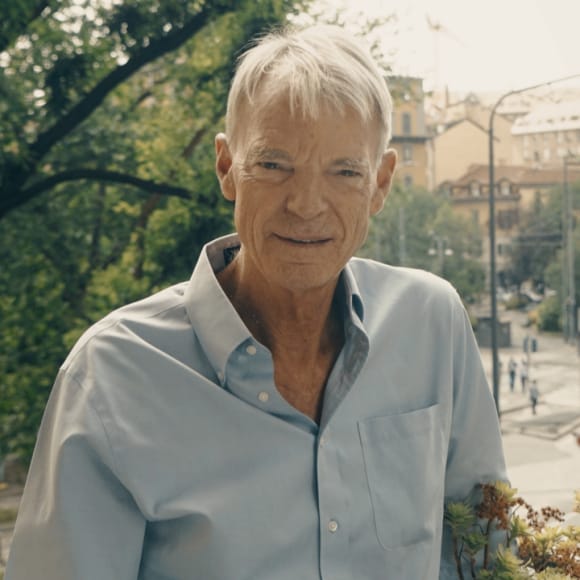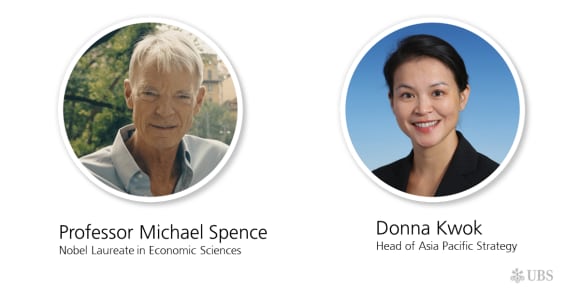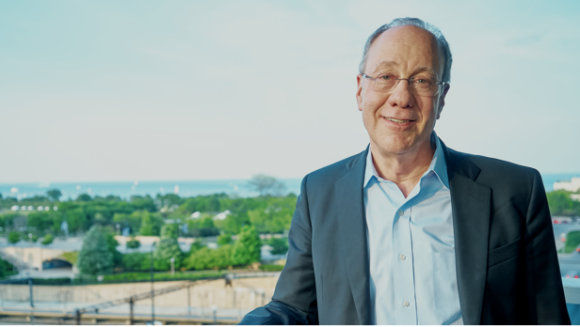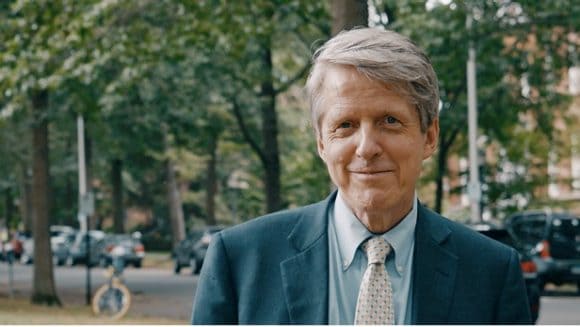Michael Spence is the former dean of the Stanford Graduate School of Business, a professor at NYU Stern and chairman of the Commission on Growth and Development. His colleagues call his mind a racecar and describe this thought leader as a good friend. Spence changed microeconomics by showing that markets aren’t always equipped with perfect information. His work on signaling and screening significantly influenced how employees and employers can improve. Spence is above all a macroeconomist focused on economic growth and poverty reduction. As a Canadian-born American citizen who has lived in the US, Asia and Europe, he’s trotting the globe like no other. He considers this rewarding because it helps him to understand "each individual place, to some extent, less from a distance, through eyes across the Atlantic."

Michael Spence
The Sveriges Riksbank Prize in Economic Sciences in Memory of Alfred Nobel, 2001 (shared)
At a glance
At a glance
Born: 1943, Montclair, New Jersey, US
Field: Microeconomics, later macroeconomics
Prize-winning work: The dynamics of information flow and market development
Most famous students: Bill Gates and Steve Ballmer (who didn’t show up much)
Best aha-moment: Tom Schelling taught him that surfers and swimmers are dangerous to each other.
Favorite Italian phrase when making a mistake: "Senza speranza!"(Without hope!)
A Nobel Laureate of the world
Any expectation of spotting the hottest trends in an ultra-modern Italian interior design are nipped in the bud when entering Michael Spence’s Milan apartment. There’s no majestic view of the Teatro alla Scala, only a huge tipi-tent in the living room, with Lego scattered across the floor. Here in Italy, where Spence lives with his wife Giuliana and his two youngest kids, he’s in easy-going dad-mode as opposed to the jet setting Nobel Laureate version.
"For a lot of people, reading about life in Peru is sort of like reading about people on Mars," he says. "It doesn’t have to be like that."
Can we design a framework that leads to growth in every country?
Spending more time in the air than on solid ground, it’s not surprising that Spence dedicates himself to the notion of global belonging. Right after receiving the Nobel Prize, he took on a project initiated by the World Bank. The challenge was to constitute a framework for growth. "We went and looked for countries that had grown at a very high rate,” he says. “Seven percent or above for 25 years and more.”
How can we produce rapid and sustainable growth?
Has this question inspired you?
Get the latest Nobel perspectives delivered to you.
While trying to find the magic formula for rapid growth in these countries, Spence says the answer is pretty simple and that there are two crucial factors. "They are open to the global economy," he says. "The single most important one is, whatever you want to call it, knowledge or technology. There have to be channels where all that comes in and then they use the global economy’s huge marketplace." By noting Asia as a successful example of a continent that used the global market for the distribution of its textiles and apparel, Spence leads to the second factor which is investing money in the future at a high rate.
What are the obstacles to economic growth in developing countries?
Factors that harm growth can spread rapidly. To Spence, the biggest threats are rising inequality, economic waste and failures in both a political matter and of social cohesion. "It’s happening again now in lots of places," he says. "With polarization, young people unemployed and so on."
How should Europe rewrite its rules?
Portugal, Spain, Italy and, above all, Greece are the countries that went sailing into oblivion, as he describes it. "We don’t have inflation to accelerate the process of reducing the public debt overhang," he says. "Without meaning to, we created an economic structure that’s very short on adjustment mechanisms and therefore it’s very difficult to see anything other than a prolonged period of rebalancing that takes a long, long, time."
What are possible strategies to fight the EU crisis?
"We need to rewrite the rules to create more unity, a centralized banking regulatory structure under the ECP, a system-wide attempt to overcome the obstacles to growth, including, when necessary, fiscal transfers," he says. He adds that there’s a huge fund in Europe to invest in underdeveloped parts of the EU, but that the current financial policies aren’t working.
The other alternative is to back out and say we can’t have a common currency, let’s give up on that, and just have an effective, extremely free economy in terms of the flow of people, capital and goods.
Economics of information serves the people
Economics of information serves the people
Spence never saw his Nobel Prize in microeconomics coming. His original paper on the signaling effect, a solution for informational gaps in markets, was a short one and not something he ever expected to make waves. But it did.
People counted, and some still do, on the assumption that the informational surroundings of a market would be complete and accessible to everybody. “If that were true, the internet wouldn’t be a very interesting thing,” says Spence. “It would give people information that they might have been able to get before but slower and at a much higher cost."
"What buyers are buying is a lottery"
"What buyers are buying is a lottery"
In markets, buyers and sellers hold different amounts and types of information. People who have ever bought a used car would probably agree. "The way buyers are really buying is like a lottery,” he says. “If there’s no feasible way to do something that distinguishes the sellers as owners of a high-quality product, they look at the price which reflects the average quality, and the actual quality of their product, and they say well, that’s not a very good deal. And if there’s no demand, sellers will take their product off the market."
That scenario can then lead to a significant price drop and an exodus of people at the top of the quality spectrum. Spence says that in extreme cases the market simply collapses or becomes a market for low-end goods.
Has this question inspired you?
Get the latest Nobel perspectives delivered to you.
How to establish trust between buyer and seller?
How can we close informational gaps?
How can we close informational gaps?
"Sometimes, there are ways to solve the problem,” he says. “With contracts, for example, which guarantee the maintenance of the product for a certain time. The low-end quality spectrum won’t do that. So there is a way to distinguish between quality and low-end products."
Signaling and screening, the major part of his work, may sound academic but it’s actually common practice. People study at elite universities like Stanford to expand their job opportunities later on. But those students, in Spence’s opinion, aren’t being strategic. They’re just responding to a set of incentives that already exist. "If you have the ability to get into them, what you get in return is really two things,” he says. “One is what you learn and the other is the signaling effect."
When informational gaps are closed, success is automatic
When informational gaps are closed, success is automatic
It sounds logical but the real breakthrough rests within the everyday application that people take for granted. "Let’s take a modern example," he begins. "Airbnb does two things. They create a market using a network structure and they solve an informational problem. Because I, as a host of an apartment, I am not in the market all that much and you, as a guest, may not be in the market that much but you’re in it often enough for the central player, who keeps very big databases, to be able to evaluate you. The other crucial part of these platforms is the two-way evaluation system, closing informational gaps."
Can digital technology become a threat?
Can digital technology become a threat?
Using digital technology has not only had a profound effect on the informational structure of markets but also on their very existence. Spence, who keeps his tablet close at hand, knows that many people his age are digitally illiterate. But, in his opinion, the increasing importance of social networks is undisputed.
“A lot of what enables artificial intelligence is that you have very fast machines connected to very fast networks, connected to gigantic databases including images and other data,” he says. “So for example the way machines recognize chairs is they take half a second and go look at 80,000 chairs and they have pattern recognition capabilities. Now they sort of know what a chair is the same way we do. Instead of telling a machine how to do something, you tell it on a much deeper level how to learn."
Why social media is increasingly important
Why do countries have to find better ways to grow?
Hear Michael Spence's view on how countries can grow sustainably while having a long-lasting positive impact.
Spence is curious about the potential of technology but also a bit frightened of where robots might lead us. His concerns are linked to the impending rise of artificial intelligence in the labor market. But as his Nobel work had a profound influence on the labor market, changing its structure and the way it’s applied, there’s still hope that we will find a way to avoid the (human) job market collapsing. And we can be sure that more important work is waiting around the corner. Luckily, Spence is always on the run.

UBS Nobel Perspectives Webinar Series
The post pandemic era will look vastly different to the world as we knew it. As we transition to the next normal, key themes have emerged and accelerated changing the way we manage investment risks and opportunities in an uncertain world.
More Nobel Laureate stories
Has this question inspired you?
Get the latest Nobel Perspectives updates delivered to you.



